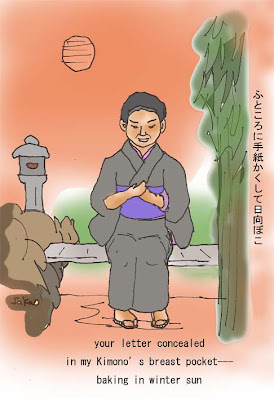Issa 一茶
雲の峰いささか松が退くか
kumo no mine isasaka matsu ga shirizoku ka
David’s English
billowing clouds--
雲の峰いささか松が退くか
kumo no mine isasaka matsu ga shirizoku ka
David’s English
billowing clouds--
have the pine trees
shrunk a bit?
by Issa, 1803
Literally, Issa wonders if the pines have "retreated" (shirizoku): they look smaller below the massive "peaks of clouds" (kumo no mine). http://cat.xula.edu/issa/
sakuo haiga




















